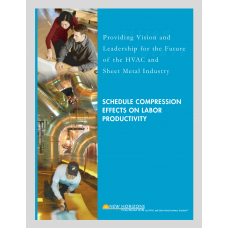
$75.00
Summary
During a typical construction project, a contractor may find that the time originally available, or normally expected to perform its work has been severely reduced. To finish the project by the completion date, the contractor is forced to find a way to speed up the progress of its work, or “compress the schedule.” The most common way to compress the schedule is either to work longer hours (overtime), add more workers (overmanning), or implement multiple shifts (shift work). Schedule compression poses a problem to contractors because it negatively impacts labor productivity and decreases profits for the contractor. Understanding how schedule compression affects labor productivity is crucial for increasing project performance, avoiding disputes, and maintaining sound financial status of one's company. While models have been developed to quantify the loss of productivity resulting from schedule compression in other industries, a similar model for the sheet metal contracting trade did not exist. This study shows how schedule compression affects sheet metal contractors' labor productivity, quantifies the effects of overtime, shift work, and overmanning on sheet metal contractors' labor productivity. Models that quantify the impact of each on the labor productivity of sheet metal contractors are presented. Recommendations for the contractor are provided to help reduce the impact of schedule compression on labor productivity.
Published: 2004
Size: 35 pages